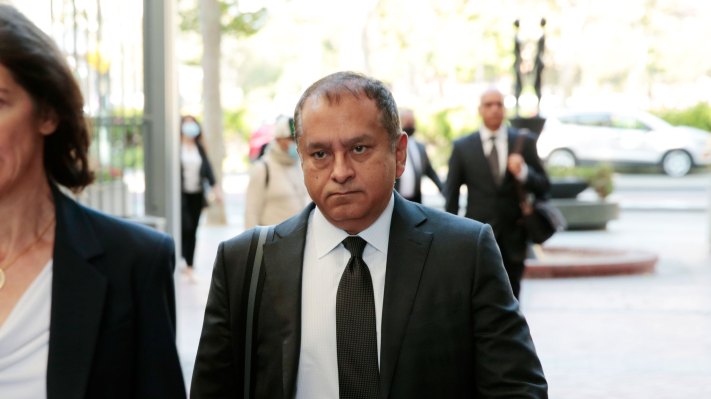Former Theranos COO and ex-boyfriend of disgraced founder Elizabeth Holmes, Sunny Balwani has been found guilty on all 12 criminal charges after a three-month trial.
At her own high-profile trial this winter, Holmes was found guilty of defrauding investors and conspiring to defraud investors on four of 11 counts, though she was not found guilty of defrauding patients. This jury, however, found Sunny Balwani guilty of defrauding both investors and patients, as well as conspiring to defraud them.
As anyone who has watched the fictionalized Hulu series “The Dropout” knows, Theranos aspired to conduct dozens of tests on a single drop of blood, which could have revolutionized the healthcare industry. But despite reaching a $10 billion valuation and spending over a decade in development, Theranos’ technology never actually worked, and in the most egregious cases, patients were presented with dangerously false medical results.
Balwani takes more blame than Holmes
Holmes and Balwani were supposed to be tried for fraud together, but the former CEO filed for a separate trial, stating that Balwani — who is 20 years her senior — had emotionally and sexually abused her. Though the court is not ruling on those allegations, the judge granted the request. This strategy seems to have somewhat paid off, since Holmes was indicted on four counts, compared to Balwani’s twelve.
Throughout the trial, Balwani’s lawyers attempted to make the case that even though he was an investor and executive at Theranos, he was not involved in key decision-making. The defense pointed out that he invested $15 million into the company, which ended up being worth over $500 million at one point, but he never cashed out. The defense failed to argue for his innocence, though — in one piece of evidence, the jury was presented a text from Balwani to Holmes that read, “I am responsible for everything at Theranos.”
In her own trial, Holmes’ defense tried to pin the company’s colossal failure on Balwani. She took the stand herself — a rarity in one’s own criminal fraud trial — to detail their relationship. Holmes described Balwani as having so much control over both her and her company that he micromanaged her daily schedule, including how she dressed and what she ate.
“He told me that I didn’t know what I was doing in business, that my convictions were wrong, that he was astonished by my mediocrity, and that if I followed my instincts I was going to fail,” Holmes said on the stand.
Balwani’s trial featured the same evidence that indicted Holmes. The prosecution focused on a key piece of evidence relating to Theranos’ relationship with Walgreens. The biotech startup’s faulty technology made its way into 41 Walgreens stores, but unbeknownst to the pharmacy giant, most of the tests were conducted on third-party equipment. Theranos’ own machines couldn’t produce accurate test results, so a lot of patients had blood drawn not with a finger prick but intravenously. So, Walgreens basically spent hundreds of millions of dollars redesigning stores for Theranos’ “wellness centers,” only for the startup to use the same old tech.
Despite Balwani’s lawyers’ claims to the contrary, a Walgreens executive testified that he worked closely with Balwani on the deal. The prosecution also displayed evidence of a text from Balwani to Holmes stating that he deliberately didn’t tell Walgreens that they were using different machines.
Holmes’ verdict was a complicated one. The jury did not reach a verdict on three wire fraud counts involving Black Diamond executive Chris Lucas, Hall Group executive Bryan Tolbert and money manager Alan Eisenman, who all testified in the trial. Judge Edward Davila found a mistrial on these three counts. Meanwhile, Balwani was found guilty of those charges.
Notably, Holmes was not held accountable for the struggles that Theranos caused patients who received inaccurate medical results.
In one case, a mother with a history of miscarriages was wrongly informed that she would have another unsuccessful pregnancy. Another patient, Erin Tompkins, used Theranos for its low costs, got flagged as HIV-positive, and then lived in limbo for three months until she could afford a second blood test. As it turned out, she didn’t actually have HIV. Meanwhile, a patient named Mehrl Ellsworth was given a false cancer diagnosis. Both Ellsworth and Tompkins told their experiences in court, but only Balwani was convicted of defrauding patients. Holmes was only held accountable for wrongdoing toward investors.
The legacy of Theranos
It has been almost seven years since The Wall Street Journal published the damning expose that began the downfall of Theranos. Now, the story of the youngest female self-made billionaire’s downfall has sparked multiple Hollywood adaptions, including an HBO documentary, a Hulu series and an upcoming Apple movie directed by Adam McKay.
The conclusion of Balwani’s fraud trial offers a bit of closure to the most notorious story of startups-gone-wrong, but the lasting impact of Theranos has lingered in the collective consciousness. Theranos is a cautionary tale warning against investing in tech without significant due diligence, yet it’s not as though over-inflated startup valuations have gone away. As the Theranos and Holmes’ own profile rose to prominence, Facebook’s haunting mantra to “move fast and break things” remained firmly in the zeitgeist, but that approach to building a company doesn’t work when people’s medical treatment is at stake.
Theranos is hardly reflective of the rest of the startup ecosystem, but female biotech founders have stated that they still find it harder to raise funding after Holmes’ fall from grace. Holmes aside, though, women in tech have always faced more obstacles to attaining venture funding than male founders. In 2021, less than 2% of venture capital funding went to all-female founding teams.
Holmes’ jury took seven days to deliberate, but Balwani’s jury came to a decision on the fifth day of deliberation. Both former Theranos executives await sentencing. Holmes’ sentencing is scheduled for September 26, while Balwani will have to wait until November 15. For now, Theranos’ former top executives are out on bail.
